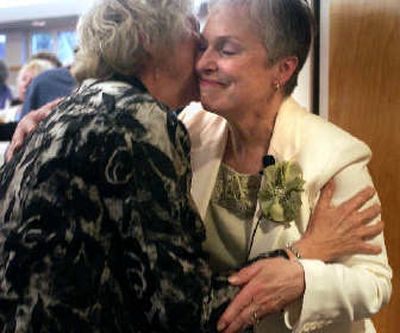Unity Church pastor retires after 19 years

In 1985 she led her first congregation at Fort Sherman Chapel, in Coeur d’Alene. It was the only Unity Church in North Idaho. And she was the only female minister in town.
On June 5, after more than 19 years of service, the Rev. Marilyn Muehlbach retired from her post at Coeur d’Alene’s Unity Church of North Idaho.
Muehlbach will enjoy time off for renewal and to make future plans.
“I’ve enjoyed helping others get in touch with their spirituality,” she said. “Many families have been with me a long time; we’ve shared births, deaths, marriages, and many other important moments in their lives. It was a private, sacred honor.”
Muehlbach serves on the board of trustees for the Association of Unity Churches in Missouri. Her husband, Ed, is a commercial real estate appraiser and president of the Coeur d’Alene Downtown Association.
Muehlbach feels positive about the work she and her congregation accomplished over the years.
“The people here are good-hearted. I believe we’ve made a difference in our community by being who we are.”
The road to becoming a Unity minister had many curves for Muehlbach. Born in Youngstown, Ohio, she was raised a Methodist. Later, she received her bachelor’s degree in economics from Dennison University, founded by the Ohio Baptist Education Society in 1831, in Granville, Ohio.
Then, after marrying a military man, having two children, and moving often, Muehlbach found herself divorced.
She relocated to the Northwest, taught ballet, and found other work with flexible hours, allowing her more time with her two children, Heather, who’s now a teacher, and Brad, who works for Microsoft. Muehlbach didn’t have a church home, and one of her children inadvertently brought it to her attention.
“One day, as I was driving the car, my son, Brad (then in preschool), was talking to a friend of his about God. Brad asked, ‘What’s a church?’ I thought to myself, ‘Oh! I’m going to have to clear this up.’ “
She tried the Methodist church, but, “It didn’t fit who I was anymore.”
Muehlbach was then encouraged to try Unity of Bellevue, in Bellevue, Wash.
“The first year, I didn’t really talk to anyone there. I just listened. Then, I got involved – taking classes and getting to know people. I made friends.”
Eventually Muehlbach and several other women began meeting for a day, once a week. It was a pivotal time for Muehlbach, and she and another in the group felt called to full-time ministry. Another woman decided on youth work.
The Unity School of Religious Studies’ Ministerial Program in Unity Village, Missouri, is the only program in the United States that trains Unity ministers. Muehlbach didn’t want to move, but compelled by her call, she applied.
Muehlbach was accepted. Her friend wasn’t.
“Eventually, that friend married a man from Spokane, and he was accepted into the program. They were there the same time I was – it was wonderful.”
Muehlbach and her children left Lee Summit, Mo., after graduating and returned to the Northwest. They settled in Coeur d’Alene.
She fondly recalls when her congregation was at Fort Sherman Chapel, where she and Ed were married.
“The small, old chapel had no restroom. So, one was dug out of the dirt foundation; it was only accessible from outside. The backroom became my office, also serving as our bookstore, coffee room, copy center, counseling office and social room. The wind blew right through the floorboards.”
In 1984, the Athletic Roundtable deeded the chapel, which was placed on the National Register of Historic Places in 1979, to the Museum of North Idaho. It’s known as the “Little Red Chapel.”
Muehlbach and her congregation moved from Fort Sherman Chapel to the church’s present location at 4465 N. 15th Street in 1997. Unity Church of North Idaho’s services are at 9 and 11 a.m., with Wednesday night services, youth and children’s groups. The church has a labyrinth, representing a pilgrimage, modeled after France’s Chartres Cathedral.
The Unity church originated in 1889, in Kansas City, Mo., by Charles and Myrtle Fillmore, both mystics. Through faith and prayer, both reportedly received healing; Myrtle, of tuberculosis and Charles, of a withered leg, caused by infection. Thus, the church began, centered on healing.
Muehlbach said that the Unity church’s “Five Basic Unity Principles,” are known worldwide.
“A copy of the principles, written by ‘Unity’s Poet Laureate,’ James Dillet Freeman, was found on FDR’s desk when he died. A copy also went to the moon with Apollo II. Freeman wrote the principles during WWII, for those wanting to pray.”
Principle One is “God is all good and active in everything, everywhere.”
That confidence reflects Muehlbach’s feelings regarding her congregation’s future. She tells this story.
“A minister retires after being with a congregation forever. An outsider asks a board member, ‘How’s the new minister doing? Surely he’s failed; he’s so young and inexperienced.’ The board member replies, ‘We don’t allow our ministers to fail.’ “
Muehlbach received just such an embrace, but not from everyone.
“As the only female minister in town then, I was voted out of the Ecumenical Council. One man said, ‘Either, she (Muehlbach) leaves, or I do.’ I didn’t go on a crusade for women’s rights, as that wasn’t my ministry’s focus. The council was dissolved a year later, but I had a hard time finding acceptance with male ministers in town.”
Yet Muehlbach was true to herself, staying faithful to her chosen path.
The Rev. Muehlbach will take two months to re-energize, and contemplate her next calling.